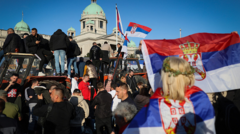A month after Serbia witnessed one of its largest protests in history, Serbian President Aleksandar Vucic managed to rally tens of thousands of supporters in Belgrade, emphasizing his commitment to stability while facing ongoing backlash from public demonstrations.
Thousands Turn Out for Vucic's Pro-Government Rally Amid Ongoing Unrest

Thousands Turn Out for Vucic's Pro-Government Rally Amid Ongoing Unrest
Serbian President Aleksandar Vucic draws a crowd in Belgrade as he seeks to consolidate support amid civil unrest.
In a show of political strength, President Aleksandar Vucic held a substantial rally in Serbia's capital, Belgrade, drawing an estimated 55,000 supporters despite ongoing civil unrest that has characterized the country's past few months. This gathering comes on the heels of significant anti-government protests, including a record turnout last month where independent estimates reported as many as 325,000 demonstrators.
The unrest was largely sparked by a tragic incident in November, wherein the collapse of a railway station canopy in Novi Sad resulted in the deaths of 15 individuals. This disaster has fueled public outrage against the ruling Progressive Party of Vucic, as many citizens attribute the tragedy to systemic corruption and inadequate safety measures tied to the government's infrastructure projects.
Vucic framed the rally as the inauguration of a "Movement for the People and the State", aimed at safeguarding Serbia from perceived threats, which he described as forces intent on destabilizing the nation. He alleged that student-led protests have undermined public order and hinted at involvement from foreign intelligence agencies, although he refrained from specifying which entities he was targeting.
Vucic's remarks also included criticism of the national broadcaster RTS, accusing it of playing a significant role in an alleged "colour revolution" against his administration. The government, led by Vucic, has faced increasing scrutiny from the public, partly due to the ramifications of the infrastructure projects that have persisted over the past decade, leading to mounting safety concerns.
Despite ongoing discontent, Vucic has maintained a firm grip on power, emphasizing during the rally that he has no intention of stepping down, even in light of multiple resignations from his administration in response to public pressure. The sentiment among many protestors, likening the ongoing situation to a fight against corruption, showcases the intense divide in Serbian society as citizens demand accountability and change.
The unrest was largely sparked by a tragic incident in November, wherein the collapse of a railway station canopy in Novi Sad resulted in the deaths of 15 individuals. This disaster has fueled public outrage against the ruling Progressive Party of Vucic, as many citizens attribute the tragedy to systemic corruption and inadequate safety measures tied to the government's infrastructure projects.
Vucic framed the rally as the inauguration of a "Movement for the People and the State", aimed at safeguarding Serbia from perceived threats, which he described as forces intent on destabilizing the nation. He alleged that student-led protests have undermined public order and hinted at involvement from foreign intelligence agencies, although he refrained from specifying which entities he was targeting.
Vucic's remarks also included criticism of the national broadcaster RTS, accusing it of playing a significant role in an alleged "colour revolution" against his administration. The government, led by Vucic, has faced increasing scrutiny from the public, partly due to the ramifications of the infrastructure projects that have persisted over the past decade, leading to mounting safety concerns.
Despite ongoing discontent, Vucic has maintained a firm grip on power, emphasizing during the rally that he has no intention of stepping down, even in light of multiple resignations from his administration in response to public pressure. The sentiment among many protestors, likening the ongoing situation to a fight against corruption, showcases the intense divide in Serbian society as citizens demand accountability and change.


















